Related Research Articles

William "Smokey" Robinson Jr. is an American R&B and soul singer, songwriter, record producer, and former record executive. He was the founder and frontman of the pioneering Motown vocal group the Miracles, for which he was also chief songwriter and producer. He led the group from its 1955 origins, when they were called The Five Chimes, until 1972, when he retired from the group to focus on his role as Motown Records vice president. Robinson returned to the music industry as a solo artist the following year. He left Motown in 1999.
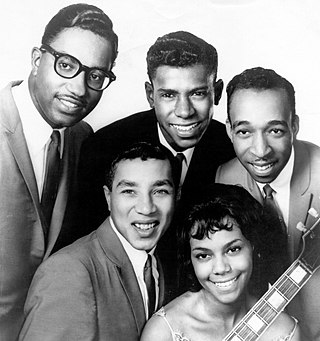
The Miracles were an American vocal group that was the first successful recording act for Berry Gordy's Motown Records, and one of the most important and most influential groups in the history of pop, soul, R&B and rock and roll music. The group's international fame in the 1960s, alongside other Motown acts, led to a greater acceptance of Rhythm & Blues and pop music in the U.S., with the group being considered influential and important in the development of modern popular music.
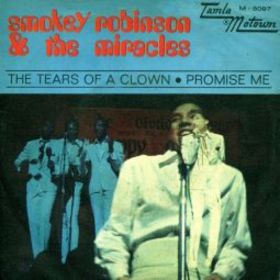
"The Tears of a Clown" is a song written by Hank Cosby, Smokey Robinson, and Stevie Wonder and originally recorded by Smokey Robinson & the Miracles for the Tamla Records label subsidiary of Motown, first appearing on the 1967 album Make It Happen. The track was re-released in the United Kingdom as a single in July 1970, and it became a number-one hit on the UK Singles Chart for the week ending September 12, 1970. Subsequently, Motown released a partially re-recorded and completely remixed version as a single in the United States as well, where it quickly became a number-one hit on both the Billboard Hot 100 and R&B Singles charts.

"You've Really Got a Hold on Me" is a song written by Smokey Robinson, which became a 1962 Top 10 hit single for the Miracles. One of the Miracles' most covered tunes, this million-selling song received a 1998 Grammy Hall of Fame Award. It has also been selected as one of The Rock and Roll Hall of Fame's 500 Songs that Shaped Rock and Roll. It was recorded by the Beatles for their second album, With the Beatles (1963). Many other musicians also recorded versions.

Ronald Anthony White was an American baritone singer, best known as the co-founder of the Miracles and its only consistent original member. White was also known for bringing Stevie Wonder to the attention of Motown Records, and writing several hit singles for the Miracles as well as other artists including the Temptations, Marvin Gaye, and Mary Wells. White died of leukemia in 1995, at 56 years old. In 2012, White was a posthumous inductee into the Rock and Roll Hall of Fame with The Miracles.

Robert Edward Rogers was an American musician and tenor singer, best known as a founding member of Motown vocal group the Miracles from 1956 until his death. He was inducted, in 2012, as a member of the Miracles to the Rock and Roll Hall of Fame. In addition to singing, he also contributed to writing some of the Miracles' songs. Rogers is the grandfather of R&B singer Brandi Williams from the R&B girl group Blaque and is a cousin of fellow Miracles member Claudette Rogers Robinson.
Warren Thomas "Pete" Moore was an American singer-songwriter and record producer, notable as the bass singer for Motown group the Miracles from 1955 onwards, and was one of the group's original members. He is also a 2012 Rock and Roll Hall of Fame Inductee, and a BMI and ASCAP award-winning songwriter, and was the vocal arranger on all of the group's hits.

"The Tracks of My Tears" is a song written by Smokey Robinson, Pete Moore, and Marv Tarplin. It is a multiple award-winning 1965 hit R&B song originally recorded by their group, The Miracles, on Motown's Tamla label. The Miracles' million-selling original version has been inducted into The Grammy Hall of Fame, has been ranked by the Recording Industry Association of America and The National Endowment for the Arts at No. 127 in its list of the "Songs of the Century" – the 365 Greatest Songs of the 20th Century, and has been selected by Rolling Stone as No. 50 on its list of "The 500 Greatest Songs of All Time", among many other awards. In 2021, Rolling Stone ranked the Miracles' original recording of "The Tracks of My Tears" as "The Greatest Motown Song of All Time".

The Fabulous Miracles is a 1963 album by The Miracles featuring the million-selling Grammy Hall of Fame hit, "You've Really Got a Hold on Me", one of the group's most popular singles. It also features the chart hits "A Love She Can Count On" and "I've Been Good To You", which The Beatles' John Lennon has identified as his favorite Miracles song. Miracles lead singer Smokey Robinson was the principal writer on all tracks, while Miracles members Ronnie White and Bobby Rogers co-wrote with him on several of the album's songs. Although two of the album’s songs, "Won’t You Take Me Back" and "Your Love", were taken from their debut album Hi... We're the Miracles, all eight new songs were released as either singles or B-sides.

Hi... We're the Miracles is the first album by The Miracles, Motown's first group, released on Motown's Tamla subsidiary label in January 1961. It was the first album released by the Motown Record Corporation. The album features several songs that played an important role in defining The Motown Sound and establishing songwriters Smokey Robinson and Berry Gordy.

Marvin Tarplin was an American musician, best known as the guitarist for the Miracles from the 1950s through the early 1970s. He was one of the group's original members and co-wrote several of their biggest hits, including the 1965 Grammy Hall Of Fame-inducted "The Tracks of My Tears". He is also a winner of the BMI Songwriter's Award, and the ASCAP Award Of Merit, and was a 2012 posthumous inductee into the Rock and Roll Hall of Fame with the Miracles.

1957–1972 is a 1972 double album by The Miracles on Motown Records' Tamla label. This two-record set is noted as the group's final series of live concerts with original lead singer Smokey Robinson, recorded over a period of three days, July 14–16, during the 1972 National Parks Centennial, at the Carter Barron Amphitheater in Washington, D.C., and charted at No. 75 on the Billboard Top 200 Album chart, and at No. 14 on its R&B Album chart. During the show, Smokey's wife, original Miracles member Claudette Rogers Robinson, who stopped touring with the group in 1964, reunited with the Miracles on stage for the first time in eight years. As a celebration of the group's fifteen years together, The Miracles made this an "all request" show, where audience members could choose which of the group's long string of hits they wanted performed. Also, at the end of the concert, Miracles fans were introduced to the group's new lead singer, Billy Griffin. According to Smokey's autobiography, Smokey: Inside My Life, The Miracles' final concert was videotaped in movie form, but was never publicly released. However, 1957–1972 was released on CD originally in 1990, and re-released again in 2004 along with The Miracles' 1969 "Live" album in the 2004 Motown/Hip-O Select release Smokey Robinson and The Miracles: The Live Collection.

Flying High Together is an album by Smokey Robinson and the Miracles on Motown Records' Tamla label, released in 1972. It is noted as The Miracles' last studio album with original lead singer Smokey Robinson, who retired from the act to concentrate on his duties as vice president of Motown. The album charted at #46 on the Billboard Pop Album chart, and featured two singles: the appropriately named "We've Come Too Far to End It Now", which matched the parent album's chart position on the Billboard singles chart, charting at #46, and reached the Top 10 of the Billboard R&B singles chart, charting at #9, and "I Can't Stand to See You Cry", which charted at #45 Pop, and #21 R&B.

Renaissance is a 1973 album by R&B group The Miracles on Motown Records' Tamla label. It was the first album by the group not to feature original lead singer Smokey Robinson on lead vocals, instead featuring him as executive producer. Robinson was replaced by lead singer Billy Griffin.

"Do It Baby" is a 1974 single recorded and released by the Motown R&B group The Miracles. The song was taken from the album of the same name, and written by Motown staff songwriters Freddie Perren and Christine Yarian and produced by Perren.
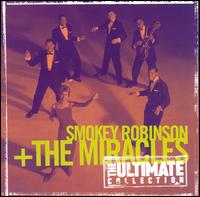
The Ultimate Collection is a compact disc by Smokey Robinson and The Miracles, released on Motown Records, catalogue 314530857-2, in February 1998. It is a collection of singles comprising many of the group's greatest hits, with liner notes written by Stu Hackel.
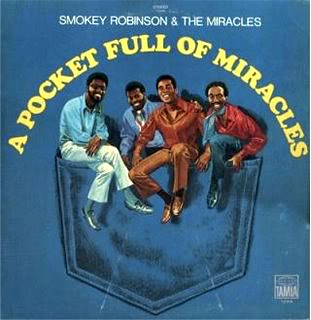
A Pocket Full of Miracles (TS306) is a 1970 album by Motown Records R&B group The Miracles, issued on its Tamla subsidiary label, one of three albums the group released that year. This album charted at #56 on the Billboard pop albums chart, and reached the top ten of the magazine's R&B albums chart, peaking at #10. It was released on September 30 of that year. Hit singles on the album included "Point It Out" and the topical Ashford & Simpson written-and-produced song "Who's Gonna Take the Blame", a sad, dark song about a girl that is turned out as a prostitute. Also included is the charting flip side "Darling Dear", B-side of "Point It Out", which reached #100 on the Billboard pop chart, and spawned a cover version by The Jackson Five.
We've Come Too Far to End It Now was a 1972 single by Motown Records R&B group The Miracles on its Tamla Label subsidiary (T54220F) and taken from their 1972 album, Flying High Together, the group's final studio album with original lead singer Smokey Robinson. This song charted at #46 on the Billboard Pop Chart, and reached the Top 10 of its R&B chart, peaking at #9.
"A Love She Can Count On" is a 1963 hit single by Motown Records R&B group the Miracles, issued on that label's Tamla subsidiary label. It was taken from their album The Fabulous Miracles, and was the follow-up to the group's million-selling Grammy Hall of Fame inducted tune, "You've Really Got A Hold On Me". The first of three singles released by The Miracles that year, this song was a Billboard Top 40 Pop Hit, peaking at number 31, and missed the Top 20 of its R&B chart by only one position, peaking at number 21.
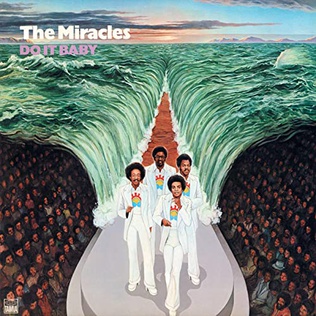
"Do It Baby" (TS334), was a 1974 R&B album by The Miracles issued on Motown's Tamla subsidiary label. It was noted as the second album by the group featuring new lead singer Billy Griffin, after the departure of original Miracles lead singer Smokey Robinson two years earlier. This was the first-ever Miracles album which had absolutely no creative input from Robinson whatsoever. While the group's first album with Griffin, Renaissance, was critically acclaimed but commercially unsuccessful, "Do It Baby" was much more successful, reaching No. 41 on the Billboard pop albums chart and No. 4 of the Billboard R&B albums chart.
References
- 1 2 Whitburn, Joel (2000). Top R&B Singles 1942-1999. Record Research Incorporated. p. 176.
- ↑ "Dead Rock Stars". Classicbands.com. Retrieved April 20, 2020.
- ↑ "Don Griffin, Guitarist for the Miracles and Anita Baker, Dies at 60: Entertainment". Hngn.com. September 9, 2015. Retrieved April 20, 2020.
- 1 2 Vecsey, Laura (February 6, 2005). "He's just a 'Love Machine,' and a big Orioles fan, too". Baltimore Sun . Archived from the original on January 2, 2014. Retrieved December 26, 2012.
- ↑ "WBMM Pete Moore Awards". Gblev.com. Archived from the original on February 19, 2012.
- ↑ "The Miracles: In the '60s, we loved and lost to this Motown legend's smooth songs (Rock and Roll Hall of Fame Class of 2012)". cleveland.com. April 3, 2012. Retrieved December 26, 2012.
- 1 2 Roberts, David (2006). British Hit Singles & Albums (19th ed.). London: Guinness World Records Limited. p. 236. ISBN 1-904994-10-5.
- ↑ "Photographic image". Media.photobucket.com. Archived from the original (JPG) on October 4, 2011.
- ↑ John Soeder, The Plain Dealer (February 9, 2012). "Crickets, Famous Flames, Comets, Miracles, Midnighters and Blue Caps added to Rock Hall induction ceremony". cleveland.com. Retrieved May 21, 2012.
- ↑ "The Miracles: inducted in 2012 | The Rock and Roll Hall of Fame and Museum". Rockhall.com. Archived from the original on February 15, 2012. Retrieved May 21, 2012.
- ↑ "Chart History - TOP R&B/HIP-HOP ALBUMS". Billboard. Retrieved December 28, 2020.
- ↑ "Billy Griffin Top Songs / Chart Singles Discography". Music VF. Retrieved December 28, 2020.
- ↑ "BILLY GRIFFIN - full Official Chart History". Official Charts Company . Retrieved December 28, 2020.